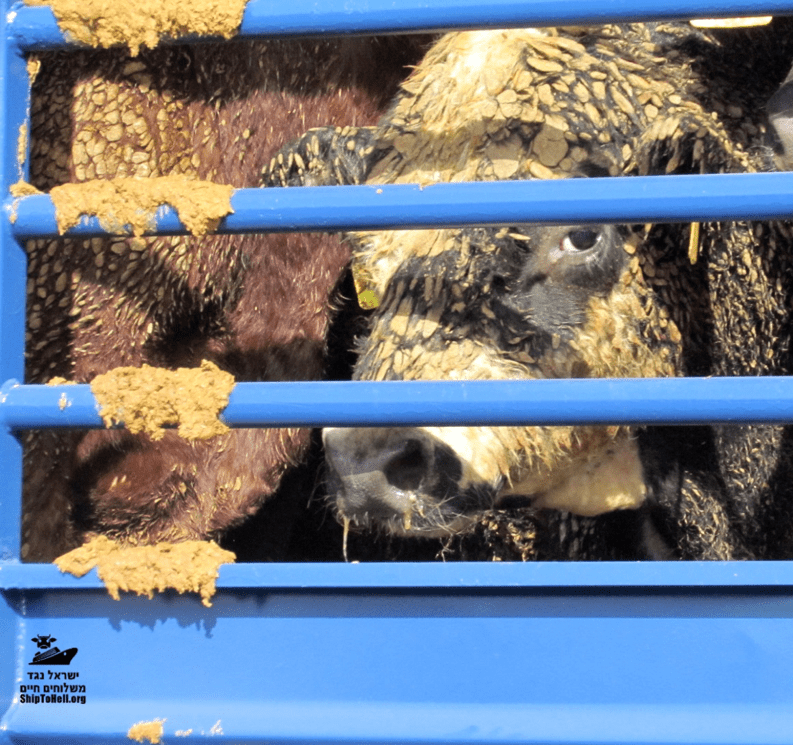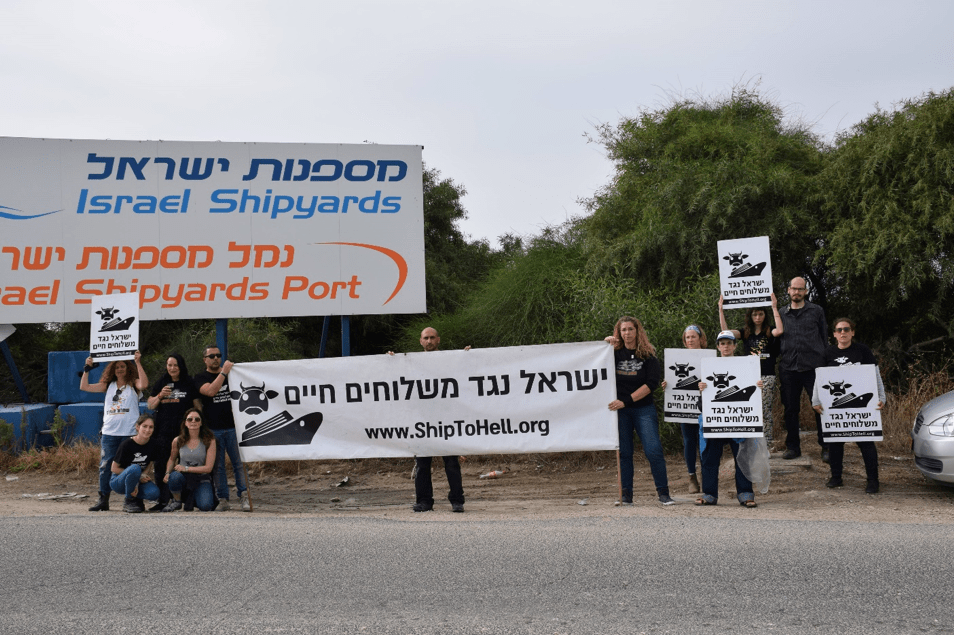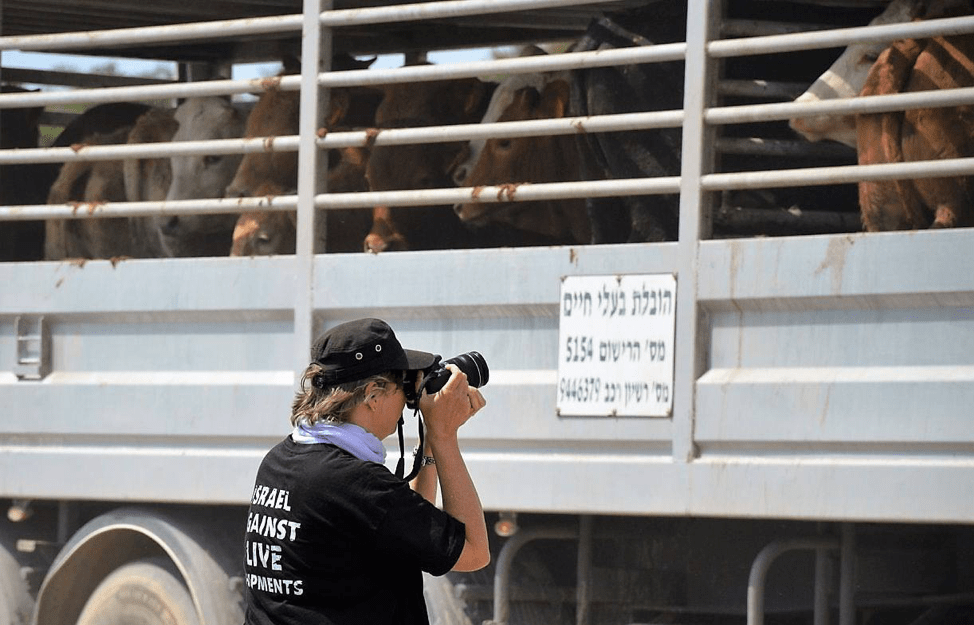By Yael Gabay, Founder, Israel Against Live Exports
In February 2014 after weekend celebrations of my partner’s and son’s birthdays, we headed for a week of scuba diving lessons in Eilat – a birthday present to them, and a long-awaited family trip after a successful campaign to close down a farm breeding monkeys for vivisection.
An hour drive from Eilat, we came across a truck packed with cattle. Our windows were open to enjoy the winter desert breeze, and we perked up unsure as to what we had just seen coming across on the other side of the highway. Another one passed us. This time, the stench was overwhelming. As we approached the city, more and more trucks kept passing.
As animal rights activists, both my partner and I were aware that live exports existed but had never seen them. Naive, and hoping to document them, we headed straight for the Eilat port and asked the guard to let us in to watch the offloading. The guard at the entrance just laughed and said that animal rights activists were not welcomed at the port. We would need a special permit to enter (In 4 ½ years we still have not received a “permit” to attend the offloading despite our numerous requests to the port management).

In a relatively comfortable hotel room that night I couldn’t fall asleep. My mind churned with images of the animals we had seen, their faces covered in feces, their eyes reflecting fear. I wondered about what they must have gone through on their journey to have their once beautiful coats covered in layers of stinky feces and their warm eyes now haunted.
Finally it was dawn and I understood I could not go diving (I was getting over a cold anyway). I gathered my strength and the little equipment we had to photograph the animals, and to meet with local activists. The activists confirmed that ships from Australia were arriving every few weeks. Each time the ships arrived, the city stunk and millions of flies invaded. Tourists and residents had complained to local authorities, but to no avail. Eilat, despite being a large tourist destination, was being used as the dirty back door of Israel through which to surreptitiously slip these traumatized animals into our country. Large animal welfare organizations had come to Eilat to document the offloading once or twice, but no further steps had been taken. No authorities, nor organizations, were tackling the problem.
We returned to Israel’s center with a mission, to ban live imports to Israel. Despite not having access to the port, I had spent the week photographing the plight of these live imported beings from every possible angle, hill, sidewalk; and gathering as much information as I could.
This is how Israel Against Live Shipments started.
Political and cultural entrenchment
Until 2014 there was a customs tax implemented on large animals and import permits were authorized sparingly, which limited the import of live animals to Israel. Since 2015, when the import tax was removed, five to six hundred thousand animals have been arriving yearly to Israel and the numbers are growing fast, even with significant public disapproval.
Around the world, many governments are hesitant to ban live animal transports. It makes me realize how this practice has become rooted into our cultures and reflects the strong lobbyism of the animal agriculture industry, tackling all sides of the political spectrum.
In Israel, an attempt to pass a bill to phase out live exports in the Knesset was temporarily halted, despite the backing of the Prime Minister and its coalition, and despite a survey showing that at least 72% of Israelis oppose the trade.
In Australia, the bill to stop live exports of sheep passed in the senate but was frozen prior to coming up for a vote in the parliament. This, in spite of 90% of Australians wanting live exports banned.
In England, Michael Gove who had raised hopes of banning live exports from the UK to EU at the beginning of the year, seems to be backing down from his position notwithstanding over one million people signing petitions across the EU, to end live exports.
I wonder, along with the hundreds of thousands of activists and millions of campaign supporters around the world: Why are politicians so reluctant to take a stand which most of their citizens support? In my opinion, it is related to their being emotionally disconnected from the victims, lacking the opportunity to identify with their nature, worth and suffering. For the office politician who has never come face to face with a bleeding calf, it easy to regard them as merely a number of imported products and overlook the individual beings who breath, feel and hurt as we do. The victims are perceived as assets, monetary goods rather than sentient beings.
“When we suffer, we suffer as equal and, in their capacity to suffer, a dog is a pig is a bear, is a boy” – Philip Wollen, Australian Philanthropist and former VP of Citibank.
The suffering is intense, and witnessing is tough.
What field activists see at the vigils we hold throughout Israel (420+ in the last four and a half years) are the sapped, ill-looking, defeated individual calves and lambs arriving at the ports: Each individual as a lost soul crying out, covered in feces, sometimes blinded from the ammonia levels on the ship, with snot and saliva mixing in, (sometimes a sign of pneumonia); Each individual who has given up fighting to survive; Each individual who had to fight for 6 to18 days to reach food pellets, and even if he succeeded, consumed less than necessary to keep his weight intact (it is estimated that calves receive 70% of their required nutrition on live export ships); Each individual seemingly looking at activists with eyes pleading “What did I do to deserve this?”

Throughout the vigils we have held, we try to comfort, we try to be a soothing hand, probably the first and last. And as importantly, we try not to displace our anger onto the people who are a part of this trade. Most of us were meat eaters in our past, and most of us did not make the connection until later in life. So, we remember to be humane to humans and to explain to those who take part in this trade that we are not here to bother them. We are present to bear witness for the animals.
Leaving the gates of hell (as we call the port gates) and returning home is the most disturbing part of bearing witness as an activist. We can leave, and they cannot. We are going back to our structured and regular lives, while they continue to suffer and will face their cruel death in some barbaric slaughterhouse or street corner. Leaving them behind, our brain is overloaded with thoughts, remembering the pain, misery and sadness reflected in their eyes. Our head is full of thoughts, yet empty, like a black hole. For me, it is reliving that 2014 night in Eilat all over again, every single time. After a vigil, images of their disheartened looks and the waves of stench brought by every truck flash into our awareness for days and nights, sometimes even for weeks. We couldn’t save them. We live with that demoralizing reality. Despite the difficulties, we know we are all they have. The only soothing hand, the only soothing voice, the last compassion they may see until their throat is violently slit to provide the unjust world with the next hamburger.
And when we go home, it is difficult to process why politicians who have almost full public backing, still choose to ignore the cries of the baby calves we left at the gates of hell.

As activists, we know that we cannot and will never give up bearing witness. We will continue being there until the madness ends. We know that the final say is with the customer and with the voter. As long as the public keeps buying meat from live imported animals this industry will continue to operate. And we also know that people have an impact through their votes. Please take a moment to consider who is on your plate, rather than what is on your plate.
“For the dead and for the living, we must bear witness.” – Eli Wiesel
Voiceless Blog Terms and Conditions: The opinions expressed on the Voiceless Blog are those of the relevant contributors and may not necessarily represent the views of Voiceless. Reliance upon any content, opinion, representation or statement contained in the article is at the sole risk of the reader. Voiceless Blog articles are protected by copyright and no part should be reproduced in any form without the prior consent of Voiceless.

